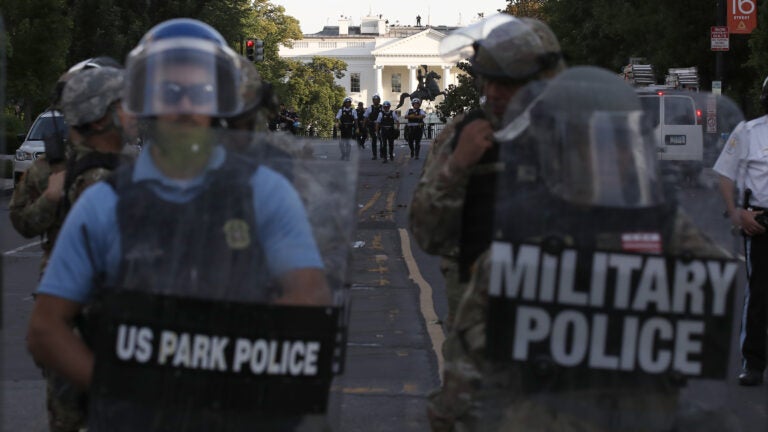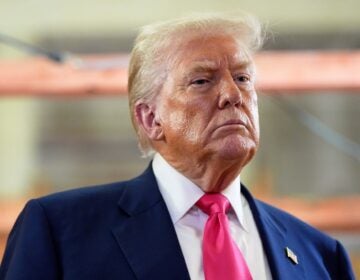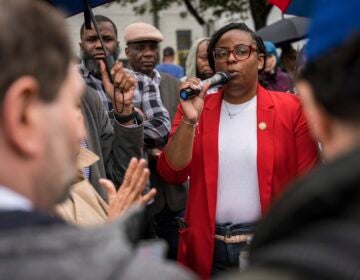Don’t send U.S. military to protests, Hill Democrats warn Trump

Authorities clear Lafayette Park in Washington, D.C., on Monday, while across the street at the White House, President Trump said he would send the military to U.S. cities if local officials don't end unrest. (Alex Brandon/AP Photo)
Democratic leaders in Congress inveighed Tuesday against what they described as a push by President Trump to use the U.S. military for cracking down on nationwide protests triggered by George Floyd’s death last week in Minneapolis while he was in police custody.
“Violence has no place and violence must be addressed,” House Speaker Nancy Pelosi told NPR’s All Things Considered. “But there is no reason for the U.S. military to be called out for this.”
Pelosi was referring to a threat Trump made Monday evening in the Rose Garden at the White House.
“If a city or a state refuses to take the actions that are necessary to defend the life and property of their residents,” Trump declared in a brief statement, “then I will deploy the United States military and quickly solve the problem for them.”
As the president spoke, federal officers in riot gear near the White House launched tear gas and pepper spray at peaceful protesters. Shortly thereafter, Trump strode through a park cleared of the demonstrators to pose with a Bible in front of St. John’s Church, leading a group of officials that included Defense Secretary Mark Esper and Gen. Mark Milley, chairman of the Joint Chiefs of Staff.
“Walking like lapdogs behind a five-time draft dodging coward who is more interested in looking like a leader than actually being one,” Sen. Tammy Duckworth, D-Ill., who lost both legs in combat as a military helicopter pilot in Iraq, said of Esper and Milley, “sends a horrifying message to our troops — including our black and brown troops — that our military’s leaders will not protect them from unlawful orders.”
In a statement on Twitter, Duckworth added, “We cannot allow any Commander in Chief to put our Armed Forces’ reputation as the last institution Americans can trust and respect at risk by using them unlawfully and putting them in a position of exacerbating the divisions driving our union apart. … Threatening military force and imprisonment against Americans exercising their Constitutional rights is not Presidential, it’s tin-pot dictatorial.”
But Trump does appear to have the power unilaterally to dispatch active-duty soldiers to trouble spots in the United States.
The 1807 Insurrection Act authorizes a U.S. president to deploy military forces for domestic emergencies. The law was updated in 2006 to include natural disasters and terrorist attacks as grounds for sending federal troops to restore order.
While condemning looting and vandalism that rocked Providence, R.I., on Monday evening, U.S. Sen. Jack Reed, a Rhode Island Democrat, called Trump’s threats to use military force against American citizens “irresponsible and destablizing.”
“The job of bringing calm will take law enforcement and the community working together,” Reed, the ranking Democrat on the Senate Armed Services Committee, said in an emailed statement Tuesday. “It will not come from recklessly invoking the Insurrection Act.”
The Democratic chairman of the House Armed Services Committee told reporters Tuesday he plans to convene an in-person congressional hearing next week to press the Pentagon’s top two officials on Trump’s possible invocation of the Insurrection Act.
“We need to hear from Chairman Milley and Secretary Esper as to exactly how they intend to use the U.S. military trying to deal with this domestic crisis,” U.S. Rep. Adam Smith, D-Wash., said on a video conference call. “If the president is basically threatening to use the U.S. military to go in and enforce the law in U.S. cities, that runs the risk of an extreme escalation in violence and of a hugely disruptive practice.”
Asked about Milley wearing camouflage fatigues in public Monday night, Smith said the nation’s highest military officer may have misread the message being sent.
“The optics of him being in uniform out there might not have been so bad if we didn’t have the president out there talking about going to war with the country and using the military and using overwhelming force,” Smith said of Milley.
In a conference call Monday, Trump told the nation’s governors that Milley was “a fighter, a war hero, a lot of victories and no losses and he hates to see the way it’s being handled in the various states, and I just put him in charge.”
Milley, whom Trump said was on the call, said nothing.
But a senior Pentagon official, speaking on condition of anonymity, said later that the Insurrection Act had not been invoked by Trump and insisted that Milley’s role and authorities have not changed.
9(MDAzMzI1ODY3MDEyMzkzOTE3NjIxNDg3MQ001))




